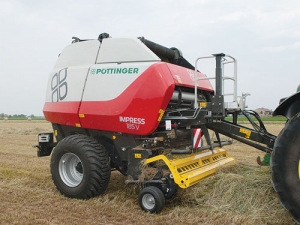Pöttinger: From grassland machinery to global innovator
Formed in 1871, Austrian agricultural machinery manufacturer Pottinger originally focused on producing grassland machinery for a little over a century.
 The Impress range will be offered with fixed or variable chambers with a combined wrapper and with a choice of master or pro specification.
The Impress range will be offered with fixed or variable chambers with a combined wrapper and with a choice of master or pro specification.
Grassland and cultivation specialist Pottinger claims a first for its new range of round balers, achieving chop quality usually associated with loader wagons.
The Impress range will be offered with fixed or variable chambers with a combined wrapper and with a choice of master or pro specification.
The feed route to the bale chamber has been redesigned: the maker's Liftup carries the crop over the feed rotor rather than the traditional route that takes crop under. The Liftup rotor carries a series of tines arranged in a patented spiral layout, which push the crop into the chamber at an angle.
This offers the benefit of high feed rates with low 'leaf shatter' and creates a filling effect across the full width of the chamber. It also removes the need to steer left and right to create good shaped bales.
The company says the units work equally well in wet or dry conditions and suit all types of crop.
Chopper versions have the Flex Cut system of 32 twin-blade reversible knives which offer a theoretical chop length of 36mm across the full bale width.
A patented knife switching system further enhances chop length flexibility and removes the need to remove blades and fit dummy units to the exposed slots.
Pottinger says the very short chop lengths increase bale density, so reducing the number of bales per hectare, cutting haulage costs and saving storage space. Also the bales break up easily for mixing in feed mixer wagons, and chopped straw is easily fed or spread with low power input.
The Impress chopper balers have a swing-out knife system with easily moved knife banks, providing good maintenance access at workbench height outside the bale chamber – important given the large number of knives in the machine.
Expect to see evaluation machines in 2016 and machines on sale for the 2017 season.
'Common sense' cuts to government red tape will make it easier for New Zealand to deliver safe food to more markets.
Balclutha farmer Renae Martin remembers the moment she fell in love with cows.
Academic freedom is a privilege and it's put at risk when people abuse it.
All eyes are on milk production in New Zealand and its impact on global dairy prices in the coming months.
Claims that some Southland farmers were invoiced up to $4000 for winter grazing compliance checks despite not breaching rules are being rejected by Environment Southland.
According to the most recent Rabobank Rural Confidence Survey, farmer confidence has inched higher, reaching its second highest reading in the last decade.

OPINION: For years, the ironically named Dr Mike Joy has used his position at Victoria University to wage an activist-style…
OPINION: A mate of yours truly has had an absolute gutsful of the activist group SAFE.